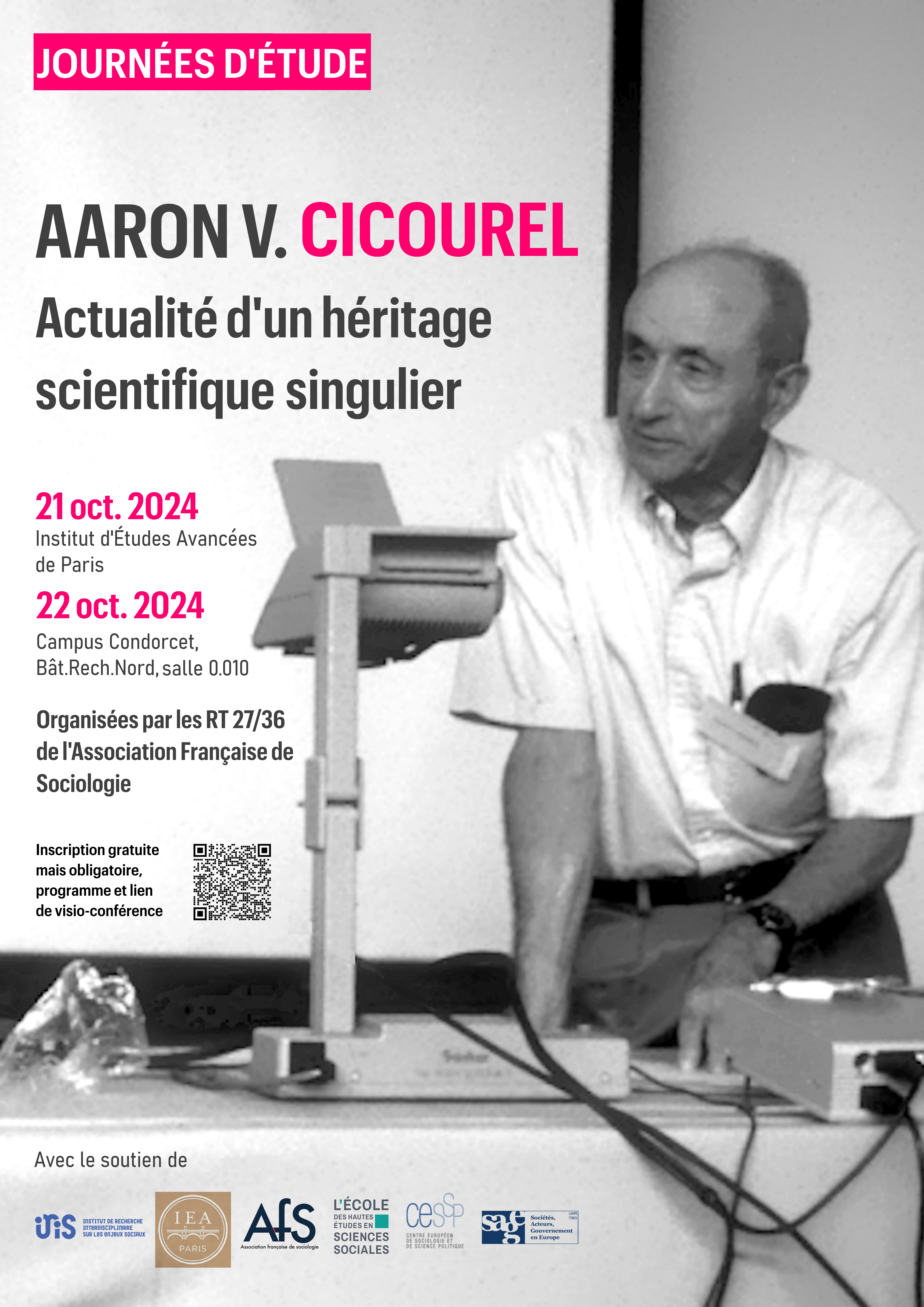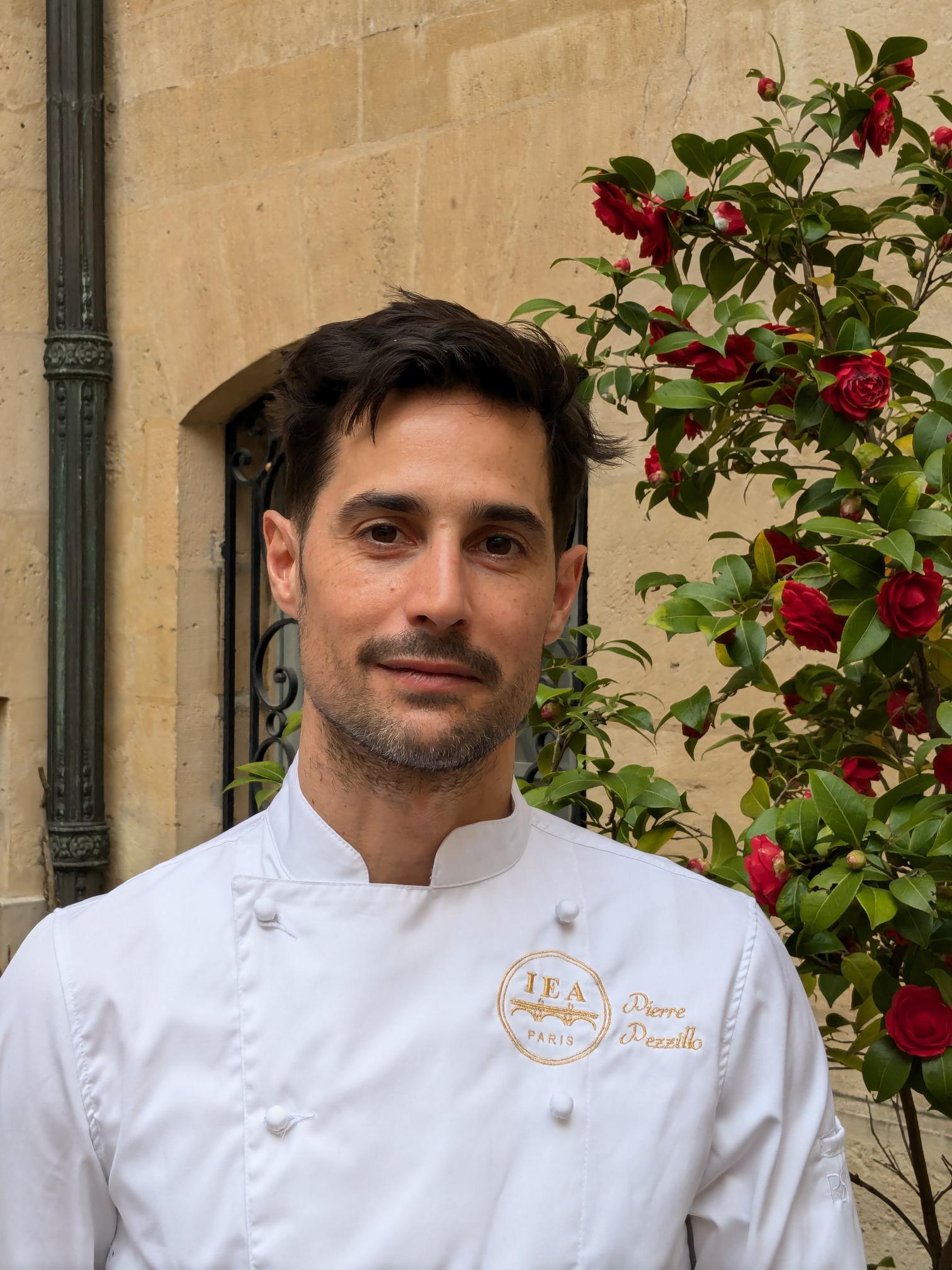Aaron V. Cicourel: Reappraisals of a scientific heritage (1928-2023)
Study days organized by the bureau des réseaux thématiques n°27 et 36 of the Association Française de Sociologie, with the support of the EHESS, the SAGE / IRIS / CESSP laboratories, and the Paris IAS.
Possibility of attending in person or by zoom.
For the day of October 21 at the Paris Institute for Advanced Study: Registration required to attend in person (see form at bottom of page).
For the October 22 event at Campus Condorcet: Free entry without prior registration.
Zoom link for both days: https://pantheonsorbonne.zoom.us/j/97016699913?pwd=c1UFnEThAycg8DpUdtIAlfFZDqJNrj.1
Presentation
These two study days are devoted to the scientific legacy of sociologist Aaron V. Cicourel (1928-2023). Co-organized by the Association Française de Sociologie's thematic networks no. 27 (Sociologie des intellectuels et de l'expertise) and no. 36 (Pratiques théoriques), the presentations and discussions in the six thematic sessions have a dual objective. First, they aim to resituate the author's project in its biographical and intellectual context - American sociology in the second half of the 20th century - in order to enrich his understanding of this side of the Atlantic.
The conference also aims to reassess Cicourel's contributions to sociological practice today. How can his methodological reflections - on the use of photos and videos, ethnomethodology and discourse analysis - help us to advance our understanding of our own objects? How can we articulate social sciences and cognitive sciences?
Detailed program
Day 1 - October 21, at the Paris Institute for Advanced Study (IEA de Paris)
9h00 : Welcome Coffee
9h20 : Welcome speech by Saadi Lahlou, Director of Paris Institute for Advanced Study, Professor at the London School of Economics
9h30 : Session 1. Introduction by the preface
Yves Winkin, professeur extraordinaire émérite, Université de Liège
« Aaron Cicourel le ponteur, avec une focale sur Erving Goffman et Pierre Bourdieu »
Pedro José García Sánchez, maître de conférences, Mosaïques / Université Paris Nanterre
« Un regard qui sourit et le quotidien comme école du monde : l’extraordinaire sociologie d’Aaron Cicourel »
Marie Jaisson, professeure, Institut de Recherche Interdisciplinaire sur les enjeux Sociaux (IRIS) / Université Sorbonne Paris Nord
« Le durkheimisme d'Aaron Cicourel »
11h15-11h30 : Coffee break
11h30 : Session 2. Cicourel at work
Saadi Lahlou
« Outsider and insider: Cicourel at work »
Dafne Muntanyola Saura, Vice Dean of Communication, Centre d'Estudis Sociològics sobre la Vida Quotidiana i el Treball (QUIT-IET), Facultat de CCPP i de Sociologia, Universitat Autònoma de Barcelona
« Le style sociologique de Cicourel "dans les marges" : quand le personnel rencontre le professionnel »
13h00-14h00 : Lunch break
14h00 : Session 3. A multi-field sociology
Julien Netter, maître de conférences, Circeft Escol, Université Paris est Créteil, « Construction des normes, rôles et statuts dans une classe de maternelle contemporaine »
Srikant Sarangi, Professor in Humanities and Medicine, Aalborg University, Cardiff University
« The context of interpretation and the interpretation of context in professional discourse studies » (titre provisoire)
Guillaume Goasdoué, chercheur indépendant, docteur de l’Université Paris 2, « Apports et limites méthodologiques du raisonnement médical d’Aaron Cicourel. Accorder ses violons en entretien avec des enquêtés aux profils sociaux contrastés »
15h45-16h00: Coffee break
16h00 : Session 4. Circulation and reception
Diego Pereyra, Universidad de Buenos Aires
« Cicourel in Buenos Aires. Methodological debates in times of political radicalization »
Pierre-Nicolas Oberhauser, chargé de recherche à la Haute École de Santé du canton de Vaud (HESAV)
« Les Mystères et l’Apostat. Le Cicourel de Bourdieu et Winkin, révélateur de la réception de l’ethnométhodologie en France »
_____________________________
Day 2 - October 22 at Campus Condorcet
9h30-10h00 : Welcome coffee
10h00-12h00 : Session 5. Integration of cognitive and social processes
Tangi Audinet, doctorant en sociologie, CESSP / EHESS
« What do you mean by "cognitive sociology", Aaron? »
Dafne Muntanyola Saura, Vice Dean of Communication, Centre d'Estudis Sociològics sobre la Vida Quotidiana i el Treball (QUIT-IET), Facultat de CCPP i de Sociologia, Universitat Autònoma de Barcelona
« Les contributions de la sociologie cognitive : un modèle d'intégration »
Stanislas Morel, maître de conférences, Experice / Université Sorbonne Paris Nord (sous réserve)
Gaëlle Chartier, docteure en sociologie, Institut de Recherche Interdisciplinaire sur les enjeux Sociaux (IRIS)
« Cognitif/social : une question de méthode ? »
12h00-13h30: Lunch break
13h45-15h45 : Session 6. Cicourel and ethnomethodology
Albert Ogien, directeur de recherche émérite CNRS - CEMS/EHESS
« Analyser le raisonnement comme phénomène social »
Chloé Mondémé, chargée de recherche CNRS / Triangle (ENS Lyon)
« La conception cicourelienne de la validité écologique »
Srikant Sarangi, professor in Humanities and Medicine, Aalborg University, Cardiff University
« Approximating ‘ecological validity’ in qualitative inquiry: Towards methodological pluralism » (titre provisoire)
15h45-16h00 : Coffee break
16h-17h30 : Workshop on editorial projects around Cicourel
End
Practical Informations
Possibility of attending in person or by zoom.
For the day of October 21 at the Paris Institute for Advanced Study: Registration required to attend in person (see form at bottom of page).
For the October 22 event at Campus Condorcet: Free entry without prior registration.
Zoom link for both days: https://pantheonsorbonne.zoom.us/j/97016699913?pwd=c1UFnEThAycg8DpUdtIAlfFZDqJNrj.1
|
|
|
Extending our understanding of responsible innovation 01 May 2025 - 31 May 2025 The aesthetic construction of a people: aesthetic experience, autochthony and social emancipation 01 March 2025 - 31 March 2025 The mountain and lowland communities in central Asia: the case of Upper and Lower Zarafshan Valley from Late Antiquity to Early Modernity 01 September 2024 - 30 June 2025 Theories of Change and Nuclear Disarmament 14 October 2024 - 18 October 2024 A value case approach for water and heritage through thelLens of Paris and the Ile-de-France 01 September 2024 - 30 June 2025 Travelling Concepts and Conceptual Engineering 01 March 2025 - 31 March 2025 Moral Mathematics 01 October 2024 - 30 November 2024 Community archaeology in Himalayas: A case study in Chitral Valley (Pakistan) 01 September 2024 - 30 June 2025 Designing a behavioural experiment to measure the cost of autonomy due to predictive AI and nudging 01 January 2025 - 31 January 2025 Theories of Change and Nuclear Disarmament 14 October 2024 - 18 October 2024 Exploring the nexus between transitional, historical and social justice 01 September 2024 - 30 June 2025 Small-scale fisheries in the Global South: Why they matter - even for Europe 01 May 2025 - 31 May 2025 Democracy at work: Historical perspectives and future challenges for employee representation in Europe 12 May 2025 - 16 May 2025 Environmental health in global history: Transboundary movement and regulatory science of toxic substances 01 September 2024 - 30 June 2025 ‘Fast-track negotiation’: a negotiation model for conflicts of the 21st century 01 November 2024 - 30 November 2024 Democracy at work: Historical perspectives and future challenges for employee representation in Europe 12 May 2025 - 16 May 2025 The body in the metaverse 01 October 2024 - 31 October 2024 Polyphonic voices: representations of lived and imagined experiences of language in exile 01 September 2024 - 30 June 2025 Is it possible to carve a cohesive women’s agenda? Between state, movements and (Muslim) women’s perils in Bangladesh 01 October 2024 - 31 October 2024 Theories of Change and Nuclear Disarmament 14 October 2024 - 18 October 2024 |































